Every time I see this Powers of Ten video about the size of the universe, I feel like the tiniest most inconsequential trivial speck of space dust that ever existed, and I love it.
Not while I’m watching it, mind you. It’s neat at first, but the unease inevitably builds, a slow crescendo of existential dread. But when it’s over, it’s over, and I’m still just hanging out here on our little rock called Earth, doing my piddly human thing. It’s wonderfully freeing—and motivating. It makes me want to go tell stories that feel the same way: profoundly humbling, while putting into perspective what really matters—the short time we have on our tiny rock with the other specks of space dust around us.
It’s one of the main things that’s always drawn me to science fiction. In my upcoming novel Rubicon, Adriene is a soldier who’s died in action ninety-six times, and is understandably over it. Her disillusionment is approaching a point of no return (get it?), until she’s presented with the opportunity to stop her resurrections and prevent her endless cycle of life and death. Rubicon is chock full of existential anxiety of all flavors, contemplating existence, autonomy, identity, trauma, empathy, human connection, and more.
And as we know, misery loves company! So please come along with me as I take a look at five novels that also don’t shy away from addressing the big questions about life, death, reality, and what it means to be human.
The Light Brigade by Kameron Hurley
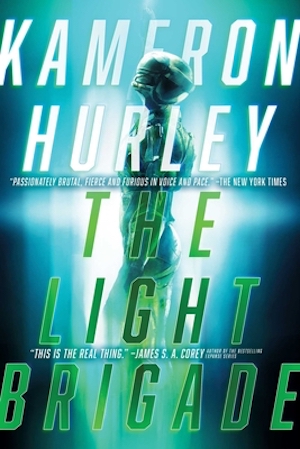
Imagine with me: you’re standing on a calm ocean shoreline. One minute, you’re innocently picking up shells and wading in the shallows. The next, the current grabs hold and pulls you under. This is The Light Brigade—a rip tide of existential terror.
Infantry recruit Dietz is on a quest for revenge after their family is wiped out by Martian colonists. They join a corporate military where soldiers are distilled into light and beamed directly to the battlefront. But Dietz falls out of sync, and begins to experience the war out of order.
In the vein of Edge of Tomorrow and Memento, this is a rare instance of time travel done right as you experience the mind-bending disorientation right along with Dietz. In classic Hurley fashion, every moment is brutal, visceral, weird, and dread-inducing. Made so effective by the realistic portrayal of relatable characters and relationships, all in a setting that’s an eerily plausible evolution of modern society. It’s a high-action sci-fi thriller that’s also deeply contemplative, asking—nay, DEMANDING—that you think about/obsess over the nature of reality and the meaning of life.
(Don’t worry, by the end it leaves you only a little drowned.)
The Luminous Dead by Caitlin Starling
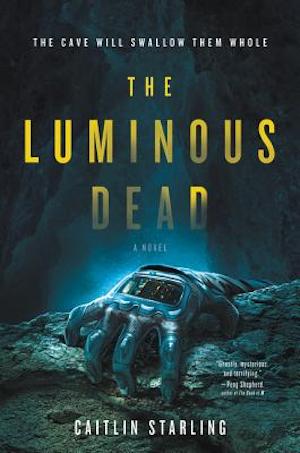
Get your existential angst with a side-dish of body horror in this claustrophobic psychological deep-dive, pun intended.
Gyre Price is a rookie cave diver who is in over her head when she takes on a solo expedition to survey a dangerous cave system. Her only line of communication is to her enigmatic handler, Em, who monitors Gyre’s suit and guides her from the surface.
As Gyre descends, anxiety abounds. She’s faced with constant disorientation, fear, doubt, paranoia, hallucinations, and looming madness, all cleverly underscored by the claustrophobic, wet, uncomfortable setting. That alongside the disturbing capabilities and close-confines of Gyre’s suit—an unnerving piece of technology that’s crucial to her survival, but entirely outside of her control. For that, she’s reliant on Em—a character who can most favorably be referred to as shady. Gyre and Em’s antagonistic battle of wills develops into something far more complicated, leading to a riveting character exploration that delves into the darkest depths of the human mind, pun also intended.
Architects of Memory by Karen Osborne
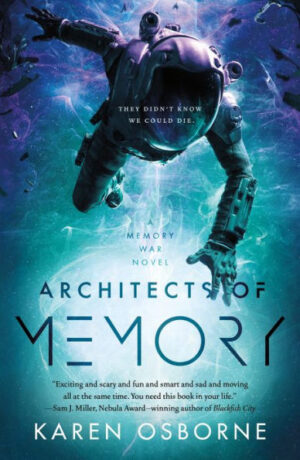
Existential Trauma: Corporate Edition!
Ash Jackson is a terminally ill space salvager who has to keep working despite the dangers presented by her chronic medical condition, which she’s forced to conceal despite contracting it due to her company’s own negligence. Plus, she can’t afford treatment because she’s indentured to a mega-corporation, which functions as a government and withholds medical treatments from non-citizens.
In case you were curious about its contemporary relevance.
Initially, the setup feels like your everyday sci-fi corporation-led future. But the build-up is super sneaky, backstories and worldbuilding gradually conspiring to confront you with the horrifying and far-reaching impact of the stakes. By then you’ve gained enough perspective to step back and see just how eerily dark and dystopic the setting is—and how uncomfortably familiar it all feels. The text coaxes you into drawing disturbing equivalencies to modern society and your own life. This could be your future—and, just like Ash, you may not see it coming until it’s too late.
Osborne shines a light on modern-day issues by giving them relatable human faces—complex characters with palpable desperation and despair, but who are also driven by just enough hope and optimism to combat your rising but justifiable fear for our own future.
This Is How You Lose the Time War by Amal El-Mohtar & Max Gladstone
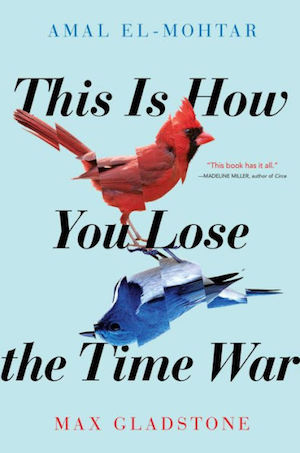
This Is How You Lose the Time War follows two time-traveling pen pals from rivalrous organizations that battle over control of the timeline. The two begin to exchange letters as they traverse time and space, each working to further their side’s objectives. Until they fall in love.
The result is a hotbed for existential woes of all flavors, exploring isolation, duty, cycles of war, morality, identity, love, loss, and more. All conveyed via letters passed in clever, bizarre, mind-bending ways and woven throughout spacetime. Time War cleverly utilizes its temporal framework to escalate the stakes and give context to the dangerous nature of their forbidden relationship.
Beautifully written and truly captivating, Time War is a clever, witty, heart-wrenching, metaphysical sci-fi saga with exactly the kind of “burn it all to the ground” energy that feeds my soul.
The Murderbot Diaries by Martha Wells
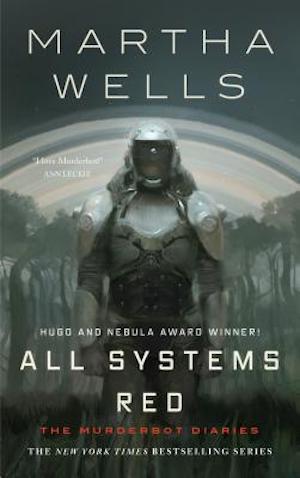
I doubt I need to convince anyone to read this series at this point, but JUST IN CASE, I am here once again to unapologetically shill for Murderbot.
As a security android who hacked its own governor module, Murderbot has been released from its programming and burdened with free choice. And with that comes so many questions:
If I’m not a SecUnit, what am I? Am I truly free? Is freedom a burden? What if I have to talk to a human? How many ways can humans find to put themselves in mortal danger? Is it limitless? Will I ever stop bothering and just watch Space Netflix concurrently but definitely not with ART?
But my favorite flavor of Murderbot crises has to be its constant examination of its outward projection, how society and individuals view it versus how it sees itself. I love all the small, performative things Murderbot does for no reason other than because it knows a human expects—or would be comforted by—a particular reaction. Uncannily relatable.
What better way to explore existential strife than by watching a snarky, cynical, antisocial robot do it better than we ever could, all while solving mysteries and upstaging human and robot alike all across the galaxy!
Buy the Book
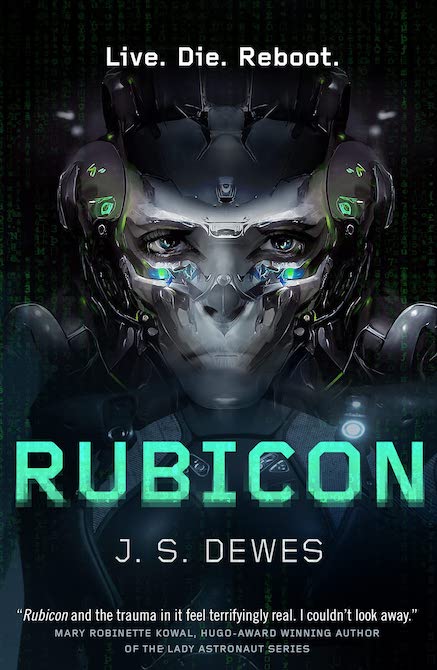

Rubicon
J.S. Dewes is an author, cinematographer, and video editor who has written scripts for award-winning feature films and shorts. A video game writer by day, she spends her free time drawing, scrolling ArtStation, cuddling her two sweet dogs and mercurial cat, and occasionally sleeping. She is the author of The Last Watch and The Exiled Fleet.














